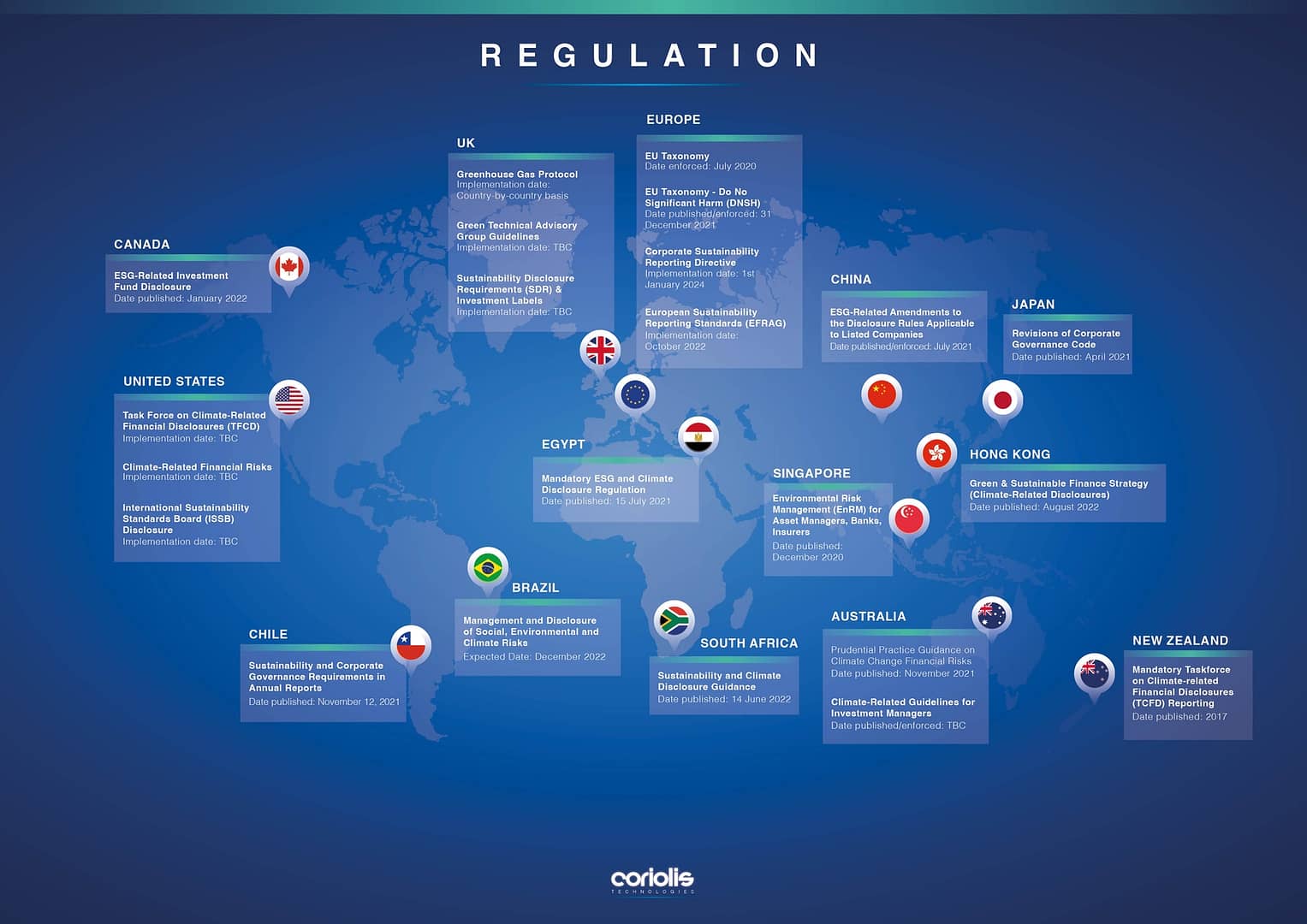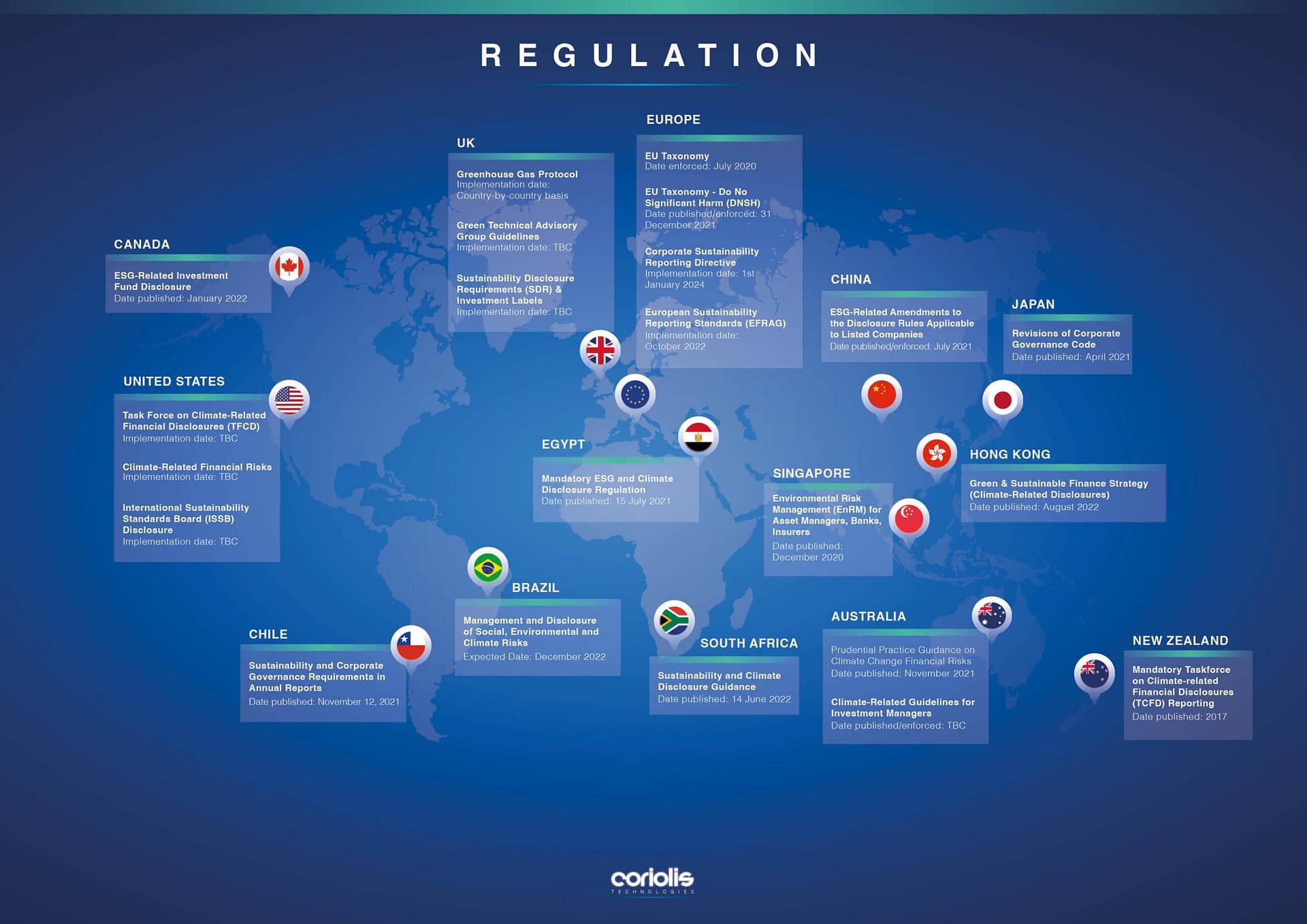
Beyond the Bottom Line: ESG Ratings – Procurement’s New Moral Compass
The world of procurement is undergoing a significant transformation, propelled by the growing importance of Environmental, Social, and Governance (ESG) factors.
Home » A Breakdown of all ESG and Sustainability Regulations
In 1937, Simon Kuznets, an economist at the National Bureau of Economic Research and Chief Statistician of the US War Production Board, presented to the US Congress the original formulation of gross domestic product (GDP), a mechanism designed to measure national income quantitatively. Following the devastation of World War I, a new metric was required to understand the true impact on national income and how wartime economies differ in planning and structure from peacetime ones in the 1920s. A subsequent benefit of GDP is that it offers insight into long-term economic trends.
The implementation of GDP has not been without scepticism; to this day, economists argue about whether it is the appropriate metric for economic growth. However, the need to measure economic activity quantitatively is not in dispute; GDP offers a principle way of measuring, comparing and explaining economic activity following the global desire for a more stable future.
Eighty-five years later, the world faces a new challenge: to make that economic activity sustainable – for people, the planet, and our long-term security.
In 2015 world leaders reached a global breakthrough by signing the Paris Agreement with a simple goal: Make a 50% cut to global emissions by 2030 to stay below 1.5°C of Global Warming. In that same year, the UN introduced 17 Sustainable Development Goals offering the building blocks for policymakers, regulators, banks, and investors to understand the symbiosis between the planet, economic activity, and economic development.
In the same way that the implementation of GDP had its sceptics, the SDGs, the Paris Agreement, and broader Environmental, Social, and Governance (ESG) initiatives have their critics, but the fundamental fact is that governments, global institutions, and policymakers understand the imperative to act. There is nothing idealistic about 193 nations coming together to sign the ambitious target set in the Paris Agreement; this is pure pragmatism based on necessity. The UN’s aim is clear – We must act using this unified framework to create a better and more sustainable future for all.
That is why governments across the globe are introducing new regulations, guidelines, and protocols to ensure that everyone, including banks and businesses, is not only aware of the necessity to reduce global emissions but also understand what they must do to support global efforts.
From this international policy framework, we can build a truly innovative approach using a multilateral methodology that is universal, unbiased, and scalable. Each SDG, regulation and policy provides a unique classification against which economic activity can be measured. With the support of international banks and businesses, Coriolis has developed a sustainability measurement solution: unique software that automatically scores the activity of individual companies against international sustainability goals. The insight offered through this system allows banks and businesses to understand precisely where and how company activity contributes to global sustainability ambitions.
Like Kuznets’s proposal those 85 years ago, this new mechanism captures all economic production by individuals, companies, and the government in a single measure. The difference today is that the process measures sustainability activity in real-time, generating a modern solution for the present economy.
In a world of Big Data and advanced technology, saying sustainability cannot, or should not, be measured is complacent. The journey is long, and the risks are high; governments are acting, policies are pending, and a sustainable movement is well underway. We only need to look at the latest regulations captured below to understand the true scale and magnitude of the efforts being taken.


The Sustainable Development Goals (SDGs) or Global Goals are a collection of 17 interlinked global goals designed to be a “blueprint to achieve a better and more sustainable future for all”. The SDGs were set up in 2015 by the United Nations General Assembly (UN-GA) and are intended to be achieved by 2030. They are included in a UN-GA Resolution called the 2030 Agenda or what is colloquially known as Agenda 2030. The SDGs were developed in the Post-2015 Development Agenda as the future global development framework to succeed the Millennium Development Goals which ended in 2015.
Date published: 2015
Learn more: https://en.wikipedia.org/wiki/Sustainable_Development_Goals
EU Taxonomy
The EU taxonomy for sustainable activities (i.e. “green taxonomy”) is a classification system established to clarify which investments are environmentally sustainable, in the context of the European Green Deal. The aim of the taxonomy is to prevent greenwashing and to help investors make greener choices. Investments are judged by six objectives: climate change mitigation, climate change adaptation, the circular economy, pollution, effect on water, and biodiversity. The taxonomy came into force in July 2020. The UK is working on its own separate taxonomy.
Date enforced: July 2020
Learn more:
https://en.wikipedia.org/wiki/EU_taxonomy_for_sustainable_activities
More information on the EU Taxonomy timeline can be found here:
For an economic activity be certified as being environmentally sustainable in keeping with respect to the EU Taxonomy, substantial contribution must be made to at least one of the EU Taxonomy objectives and simultaneously have no significant detrimental impact on the other five. The principle in accordance with this is called ‘Do No Significant Harm’ (DNSH). Aside the six environmental objectives, the EU taxonomy also set forth four requirements to be met by an economic activity in order to be taxonomy oriented:
Date published/enforced: 31 December 2021
Learn more:
The Sustainable Finance Disclosures Regulations (SFDR) are technical standards adopted by the European Commission and are to be used by financial market participants when disclosing sustainability-related information. Today’s Delegated Regulation specifies the exact content, methodology and presentation of the information to be disclosed, thereby improving its quality and comparability. Under these rules, financial market participants will provide detailed information about how they tackle and reduce any possible negative impacts that their investments may have on the environment and society in general. Moreover, these new requirements will help to assess the sustainability performances of financial products.
Date implemented: 10th March 2021
Learn more: https://ec.europa.eu/finance/docs/level-2-measures/C_2022_1931_1_EN_ACT_part1_v6%20(1).pdf
EU law requires certain large companies to disclose information on the way they operate and manage social and environmental challenges. This helps investors, civil society organisations, consumers, policy makers and other stakeholders to evaluate the non-financial performance of large companies and encourages these companies to develop a responsible approach to business. The Non-Financial Reporting Directive (NFRD) lays down the rules on disclosure of non-financial and diversity information by certain large companies.
On 21 April 2021, the EU Commission adopted a proposal for a Corporate Sustainability Reporting Directive (CSRD), which would amend the existing reporting requirements of the NFRD. The proposal:
Implementation date: 1st January 2024
On 25 June 2020 the European Commission (EC) issued a request for technical advice mandating the European Financial Reporting Advisory Group
(EFRAG) to undertake preparatory work for the elaboration of possible EU non-financial reporting standards in a revised Non-Financial Reporting Directive (NFRD).
Following the request from the European Commission to start technical work building on the recommendations of the PTF-NFRS, EFRAG is making substantial progress in developing draft European sustainability reporting standards, while reforming its governance structure.
Implementation date: October 2022
Learn more: https://www.efrag.org/Activities/2010051123028442/Sustainability-reporting-standards-roadmap
Greenhouse gas emissions are categorised into three groups or ‘Scopes’ by the most widely-used international accounting tool, the Greenhouse Gas (GHG) Protocol.
Implementation date: Country-by-country basis
Learn more: https://www.carbontrust.com/resources/briefing-what-are-scope-3-emissions
The Green Technical Advisory Group (GTAG) aims to provide independent advice to Government on implementing a UK Green Taxonomy – a common framework setting the bar for investments that can be defined as environmentally sustainable. This will help tackle ‘greenwashing’, improve understanding of environmental impact to help companies and investors make informed green choices, support investment in sustainable projects and boost efforts to tackle climate change.
Implementation date: TBC
Learn more: https://www.greenfinanceinstitute.co.uk/programmes/uk-green-taxonomy-gtag/
The Financial Conduct Authority (FCA) are seeking initial views on new sustainability disclosure requirements for asset managers and FCA-regulated asset owners, as well as a new classification and labelling system for sustainable investment products.
Implementation date: TBC
The TFCD proposal was introduced by the Securities and Exchange Commission (SEC) as a US approach to climate disclosure, building upon current market practices, including proposed accommodations for smaller companies, balancing principles-based requirements with the need for climate-related metrics, phasing in certain requirements over time, and even providing a safe harbor for the disclosure of Scope 3 emissions.
The proposal broadly contains the following provisions:
Implementation date: TBC
Learn more: https://www.sec.gov/news/statement/lee-climate-disclosure-20220321
The Federal Insurance Office (FIO) of the U.S. Department of the Treasury (Treasury) is issuing this Request for Information (RFI), following the May 20, 2021 Executive Order on Climate-Related Financial Risk, to solicit public input on FIO’s future work relating to the insurance sector and climate-related financial risks. FIO’s efforts will focus on three initial climate-related priorities, which are described below. Additionally, this RFI seeks input on how FIO’s data collection and dissemination authorities can best be used by FIO in support of these priorities, as well as to monitor and assess the insurance sector and climate-related financial risks.
Implementation date: TBC
International investors with global investment portfolios are increasingly calling for high quality, transparent, reliable and comparable reporting by companies on climate and other environmental, social and governance (ESG) matters.
On 3 November 2021, the International Financial Reporting Standards (IFRS) Foundation Trustees announced the creation of a new standard-setting board—the International Sustainability Standards Board (ISSB)—to help meet the demand for ESG reporting.
The intention is for the ISSB to deliver a comprehensive global baseline of sustainability-related disclosure standards that provide investors and other capital market participants with information about companies’ sustainability-related risks and opportunities to help them make informed decisions.
Implementation date: TBC
Learn more: https://www.ifrs.org/groups/international-sustainability-standards-board/
The purpose of Canadian Securities Administrators (the CSA) ESG-Related Investment Fund Disclosure is to provide guidance on the disclosure practices of investment funds as they relate to environmental, social and governance (ESG) considerations, particularly funds whose investment objectives reference ESG factors (ESG Funds) and other funds that use ESG strategies (ESG Strategy Funds, and together with ESG Funds, ESG-Related Funds).
This disclosure:
Date published: January 2022
After the conclusion of a public consultation process, the (CMF) issued General Rule No. 461, which incorporates sustainability and corporate governance issues in the Annual Reports of supervised financial institutions. It applies to entities such as banks, insurance companies, issuers of publicly offered securities, general fund managers, and stock exchanges. The aim is for supervised entities to report on their policies, practices and goals adopted in environmental, social and governance (ESG) matters.
This is due to the growing relevance that the disclosure of this type of information has acquired both locally and internationally. ESG information allows investors to evaluate investment alternatives in which their interests will be better protected, as well as identify companies able to better identify, quantify and manage their risks.
Date published: November 12, 2021
Learn more: http://cmfchile.cl/portal/principal/613/articles-49809_recurso_1.pdf
The Central Bank of Brazil (BCB) disclosure presents rules for social risk, environmental risk, and climate-related risk management by regulated institutions of the National Financial System, published on September 15, 2021. The new regulation incorporates principles of proportionality that consider an institution’s size and risk profile and will apply from December 2022. This new set of rules on disclosure is directly linked to recent improvements to the risk management framework comprising specific requirements for social risk, environmental risk, and climate-related risk and extending to these risks the general requirements applicable to all financial risks. Both regulations are part of BCB’s efforts in acknowledging the relevance of social, environmental, and climate-related issues for the Brazilian economy and financial stability.
Expected Date: December 2022
Learn more: https://www.bcb.gov.br/content/about/legislation_norms_docs/BCB_Disclosure-GRSAC-Report.pdf
The Australian Prudential Regulation Authority (APRA) Prudential practice guidance on climate change financial risks is designed to assist banks, insurers and superannuation trustees to manage the financial risks of climate change. The guide imposes no new regulatory requirements or obligations, but instead assists APRA-regulated entities to manage climate-related risks and opportunities within their existing risk management and governance practices.
The guide covers APRA’s view of sound practice in areas such as governance, risk management, scenario analysis and disclosure of climate-related financial risks. It is designed to be flexible in allowing each institution to adopt an approach that is appropriate for its size, customer base and business strategy.
Date published: November 2021
The Financial Services Council (FSC), Australia’s financial services industry’s standards and policy setting body, announced the release of new climate-related guidelines for investment managers to set targets, report on risk, and avoid greenwashing.
The primary purpose of the guidelines is to set common baseline expectations for the industry’s approach to net zero claims, disclosure of climate-focused investment features, and reporting on climate-related risk.
Date published/enforced: TBC
Learn more: https://www.esgtoday.com/australia-financial-industry-body-sets-anti-greenwashing-rules-for-fund-managers/
The China Securities Regulatory Commission (CSRC) sets out the following the goals around ESG disclosure:
Date published/enforced: July 2021
On sustainability and ESG, revisions from the Financial Service Agency (FSA), Japan’s Corporate Governance code requires companies to:
Date published: April 2021
Learn more: https://www.fsa.go.jp/en/news/2021/20210406.html
In August 2022, the Securities and Finance Commissions (SFC) published its Agenda for Green and Sustainable Finance to set out further steps to support Hong Kong’s role as a regional green finance centre, having achieved the goals set out in its Strategic Framework for Green Finance. Its work will focus on:
Date published: August 2022
Learn more: https://www.sfc.hk/en/Green-and-sustainable-finance
The TCFD was created in 2015 by the Financial Stability Board to develop consistent climate-related financial risk disclosures for use by companies, banks, and investors in providing information to stakeholders.
The TCFD produced recommendations in 2017 that outline a framework for reporting climate-related information.
The TCFD recommendations incorporate four key themes: governance, strategy, risk management, and metrics and targets. Under each theme, 11 disclosures are recommended.
Date published: 2017
Learn more: https://www.xrb.govt.nz/standards/climate-related-disclosures/
The guidelines set out the expectations of the Monetary Authority of Singapore (MAS) on environmental risk management for all fund management companies and real estate investment trust managers.
The guidelines cover:
Date published: December 2020
The Johannesburg Stock Exchange (JSE) released Sustainability and Climate Disclosure Guidance that aims to promote transparency and good governance, and guide listed companies on best practice in environmental, social and governance (ESG) disclosure.
The JSE disclosure guidance combines global best practice with local relevance, and simplifies ESG disclosure for both listed and private companies in a context of a myriad of frameworks, guidelines, standards and ratings in the market.
Date published: 14 June 2022
Learn more: https://www.jse.co.za/news/news/jse-unveils-guidance-framework-aid-progress-disclosure-and-governance
The taxonomy is designed for investors, issuers, lenders, and other financial sector participants to track, monitor, and demonstrate the credentials of their green activities. The taxonomy serves as an official classification of a minimum set of assets, projects, and sectors eligible to be defined as “green” or environmentally friendly.
While the emphasis is on the environment, it also incorporates criteria aimed at ensuring the implementation of South Africa’s labour laws and policies. Taken together, the taxonomy supports South Africa’s national policy and voluntary private sector initiatives promoting sustainable finance by reducing costs and uncertainty in classifying a core set of green activities.
The taxonomy aims to unlock a number of benefits:
Date published/enforced: 1st April 2022
Learn more: http://www.treasury.gov.za/comm_media/press/2022/SA%20Green%20Finance%20Taxonomy%20-%201st%20Edition.pdf
The Financial Regulatory Authority (FRA) issued resolutions requiring companies listed on the Egyptian Stock Exchange, and companies operating in non-bank financial activities to submit environmental, social, and governance disclosure reports related to sustainability (ESG standards).
The Chairman of the Authority stated that ESG disclosure reports will be applied to all companies whose securities are listed on the Egyptian Stock Exchange, in addition to companies operating in non-banking financial activities whose issued capital or net ownership rights are not less than 100 million Egyptian pounds.
Whereas, companies whose issued capital or net ownership rights are not less than 500 million Egyptian pounds and that are listed on the Egyptian Stock Exchange, and which are engaged in non-banking financial activities, will be required to complete disclosures related to the financial effects of climate change in accordance with the Task Force on Climate-Related Financial Disclosures (TCFD), with its annual report prepared by its board of directors and attached to the annual financial statements.
Date published: 15 July 2021
Learn more: https://sseinitiative.org/all-news/egyptian-fra-issued-mandatory-esg-and-climate-disclosure/


The world of procurement is undergoing a significant transformation, propelled by the growing importance of Environmental, Social, and Governance (ESG) factors.

TradeSun and London Forfaiting Company (LFC) have announced an agreement for LFC to leverage TradeSun’s digital technology to advance their risk and compliance capabilities, with focus on ESG sustainability, across global trade.

Whether ESG and sustainability-linked initiatives and policy meet the needs of developing economies remains a topic of intense debate